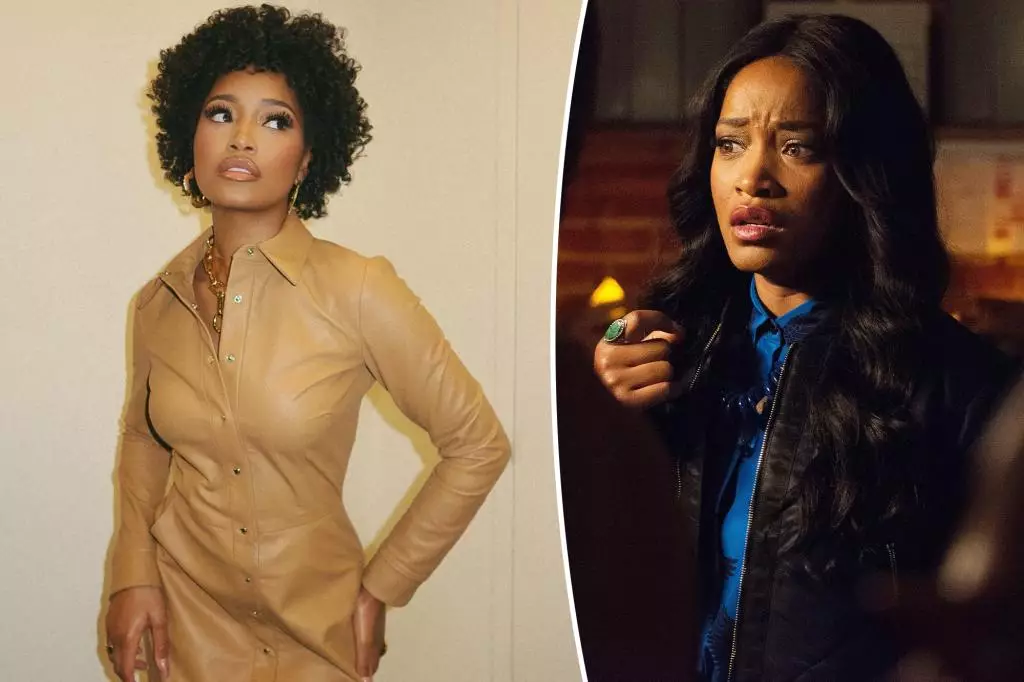Keke Palmer, a rising star in Hollywood, boldly shares her experiences of racism and professional strife in her upcoming memoir, “Master of Me: The Secret to Controlling Your Narrative.” In it, she recounts a troubling incident on the set of “Scream Queens,” where a co-star, referred to as “Brenda,” reportedly made a racist remark aimed at her. Palmer’s revelation comes in the context of a broader conversation surrounding racism in the entertainment industry, illustrating the challenges that many performers of color continue to endure.
The alleged incident occurred during a moment of tension among the cast, leading to Palmer’s attempt at diffusing the anger by suggesting that they prioritize fun and mutual respect. However, the situation escalated when “Brenda” retorted dismissively, challenging Palmer’s attempt to foster harmony. The co-star’s comment, invoking the name of civil rights icon Martin Luther King Jr., aimed to undermine Palmer’s call for respect, exposing the insidious nature of racism amid the entertainment industry’s often-glamorized facade.
In a poignant interview discussing her memoir with the Los Angeles Times, Palmer chose not to disclose the identity of her co-star. She expressed a desire to reclaim her narrative and convey her strength, stating, “I’m not no victim. That’s not my storyline, sweetie.” This statement isn’t merely a deflection of negativity – it speaks volumes about Palmer’s approach to handling workplace toxicity, particularly within an industry plagued by deep-seated racial issues.
The balanced manner in which Palmer addresses this encounter is commendable. Rather than allowing the derogatory remark to define her, she frames her experience as one of resilience. By consciously avoiding victimhood, Palmer positions herself as an empowered individual, capable of rising above the ignorance displayed by her colleague. In a world where women, especially women of color, frequently face microaggressions and outright racism, her stance is both refreshing and necessary.
Immediately following Palmer’s interview, social media erupted with speculation regarding the identity of “Brenda.” While many users conjectured that Lea Michele could be the co-star in question, such speculation underscores the turbulent dynamics often at play between actors in Hollywood. The fact that cast relationships are often viewed through a lens of rivalry only amplifies the discomfort experienced within the industry.
Interestingly, these discussions reveal more than just gossip; they highlight the need for accountability in Hollywood. The constant scrutiny that actors face regarding their off-screen dynamics serves as a reminder of the pervasive culture of toxicity that can exist within entertainment settings. Palmer’s choice to remain vague about her co-star not only robs the alleged perpetrator of power but also invites a broader conversation about the need for systemic change in how the industry addresses such issues.
In addition to recounting the racially charged incident, Palmer addresses another pivotal moment in her professional journey—meeting with Ryan Murphy, the creator of “Scream Queens.” She describes an encounter where he expressed disappointment over her absence for a work commitment, framing it as a learning moment. Palmer’s acknowledgment of Murphy’s perspective—without compromising her own sense of self-worth—illustrates the complexities of managing personal ambitions within a demanding industry.
The memoir reflects how navigating professional obligations and personal identity can clash, particularly for artists trying to assert their place in a competitive environment. By pressing for recognition as an artist and businesswoman, Palmer challenges the traditional narratives that often marginalize women and people of color.
A Step Toward Healing
As Palmer’s memoir “Master of Me: The Secret to Controlling Your Narrative” awaits its release on November 19, it promises to offer more than just her account of personal experiences. It serves as a voice for countless individuals who have faced similar challenges in an industry that, despite its glamour, continues to grapple with issues of racism and professional inequity. Palmer stands as a testament to resilience, paving the way for others to reclaim their narratives and propel meaningful change in Hollywood.

Leave a Reply